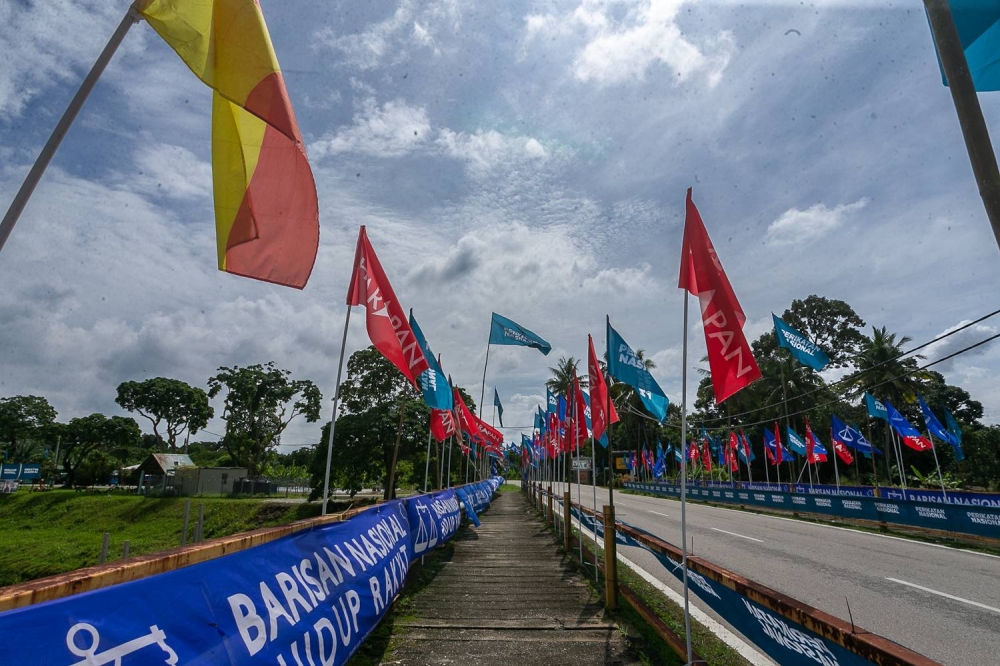BANGI, Nov 16 — The old town of Bangi is not much different from when it was rebuilt after a huge fire in 1936, with the biggest difference perhaps being that the train station originally built in 1905 now serves the KTM Komuter service as well.
The station still stands by the side of a small hill leading to the main road, with temples and a mosque situated nearby. Down the road, old shop lots made out of wood — said to be part of the 18 original ones set up in 1906 when the town was originally founded — still currently stand side by side with their newer brick neighbours.
Past the wooden shop lots, the village head office is situated on the main road of Jalan Bangi. Situated opposite a small old Chinese coffee shop with wooden frames and zinc roofs, it governs the various villages in Bangi.
Knowing its history, it feels jarring to consider that the name Bangi was not even used for a state assembly seat until 2003. It was then placed under the Kajang state seat, itself falling under the Hulu Langat federal seat.
Bangi was then placed by the Serdang federal seat, before replacing the latter and being promoted to a federal seat itself in 2018 — a testament to its burgeoning population of 303,430 voters, which is one of the biggest seats in the country and almost double the previous head count of 178,790 voters in 2018.

Is being a Muslim a must to win Bangi?
Consequently, the seat is also seeing a crowded fight in the 15th general election with eight candidates, including Pakatan Harapan's (PH) Syahredan Johan, who hopes to defend the seat won by his DAP senior Ong Kian Ming since 2013 when it was still Serdang.
Syahredzan is facing Barisan Nasional’s (BN) Datuk Hoh Hee Lee, Perikatan Nasional’s (PN) Nazrul Hakim Nazir, Gerakan Tanah Air's (GTA) Annuar Salleh, and Parti Rakyat Malaysia’s (PRM) Chee Chee Meng.
Three independent candidates have also thrown their hats into the ring: Suthan Mookaiah, Muhammad Fauzi Hasim and Dr Jamal Hisham Hashim
Though expected to win, Syahredzan is also seen by locals as a ploy for DAP and PH to win more Malay votes, especially in Malay-majority areas such as Bandar Baru Bangi and Kampung Teras Jernang.
"I am sure Syahredzan is a good candidate but he is from DAP. But I think it is a good sign if he can represent the people here,” local Rafiz Amin told Malay Mail, admitting that DAP has little by little shed its public perception of being "chauvinist" towards the Malays.
"He prays five times a day, he has a good background and qualifications. That could be a plus point,” he added, highlighting how Syahredzan has shown his presence in the area even before being nominated since he is PH's Bangi Parliament coordinator.
The mention of Syahredzan's religious credentials may seem incongruous in an urban area, but in Bangi this is more of a reflection of Syahredzan’s two Malay-Muslim rivals who play the religious card.
Islamist party PAS, contesting under PN, has fielded the 27-year-old Nazrul, who was formerly a special officer for ex-religious affairs minister Datuk Zulkifli Mohamad.
Meanwhile, GTA has fielded Annuar Salleh from PAS' splinter party Berjasa. The religious teacher known as ustaz was formerly the Hulu Langat chief of controversial Islamist group Ikatan Muslimin Malaysia (Isma) — whose headquarters is in Bandar Baru Bangi, and is fielding at least six candidates under GTA.
"It is important that Malays are seen not just as professional but also religious as well. Religious people will be seen with more integrity,” said Bangi voter Wan Ikmal Abdullah, referring to some of the more conservative Malay voters.

Rat race to influence votes
Despite this sentiment, the truth is that Bangi as a seat is home to affluent and vibrant multi-ethnic communities divided into 62.2 per cent Bumiputera, 28 per cent ethnic Chinese, and 8.4 per cent ethnic Indians — a close enough mirror to the national population.
While Bandar Baru Bangi and Kampung Teras Jernang is home to stridently "halal and 100 per cent Malay owned" restaurants and tudung sellers, areas such as Balakong New Village is predominantly Chinese, while Bandar Mahkota Cheras does not even have a single mamak outlet.
Chinese educationist group Dong Zong — which Isma would see as an ideological opposite — is also headquartered in the constituency.
To drive from one end of the constituency at Bandar Damai Perdana to the other end in Universiti Kebangsaan Malaysia would take more than 30 minutes in normal traffic, and twice as long during rush hour.
This congested traffic during rush hour amid a rat race that is affecting almost every voter from UKM students to office workers at Cheras Perdana may instead be the prevailing make-or-break issue for candidates.
Even before Nomination Day, the matter was already raised by Syahredzan, who promised to raise issues relating to public transport should he win — alongside other pet issues such as human rights, data privacy and draconian laws.
"I don’t care what race, religion or how drunk they are but they need to do something about the horrendous traffic,” said Grace Ho, who has lived in Balakong for more than 20 years.
For a lot of voters, this situation is ironic considering the number of highways and expressways that run through the constituency: PLUS, SILK, Grand Saga, Lekas, and even the just-launched Sungai Besi-Ulu Kelang Elevated Expressway (Suke).
"Most of us totally depend on the MRT, but when it breaks down, we are out of luck. I don’t want to drive two hours to get to work,” said Imran Alias. referring to the very recent breakdown of train services in Kuala Lumpur.
In 2018, DAP's Ong won the seat with a whopping 68,768-vote majority against PAS' Mohd Shafie Ngah, MCA's Liew Yuen Keong, and PRM's Wan Jinn Woei.






















